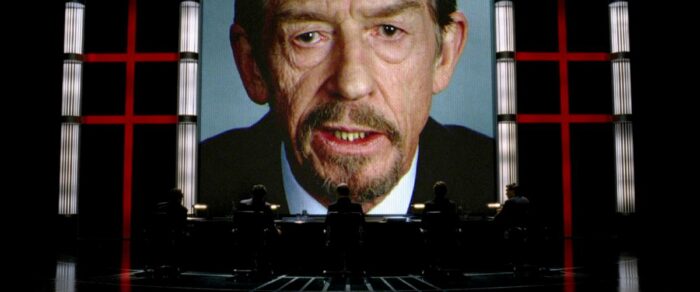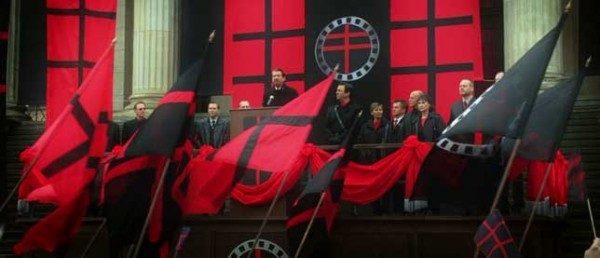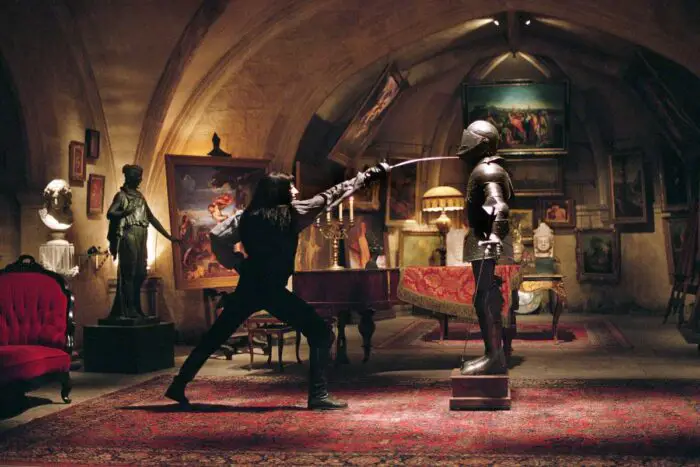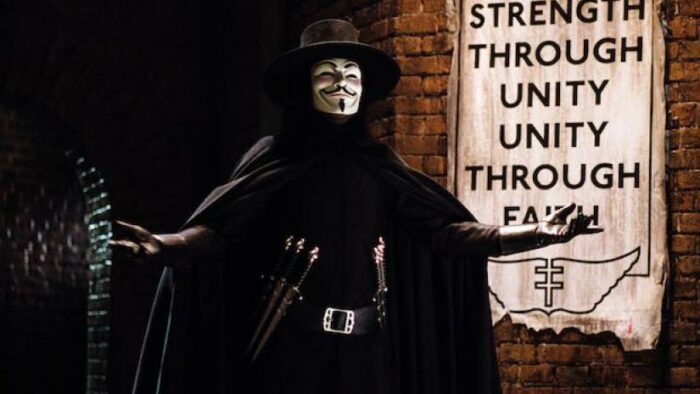V for Vendetta is a film that becomes increasingly relevant as time moves forward. With the depressing and sometimes scary state of politics in the US and here in the UK, more than ever I wish that someone like V could come along and give this current broken system the wake-up call it so desperately needs. I‘m writing this in London, where the narrative is set and where art is most certainly imitating real life. The moronic Boris Johnson is making daily headlines with his buffoonery, trying to clean up the absolute shit show he helped create that is Brexit. Our departure from the EU and the president of the United States are inciting more racism and hate every day.
With moronic comments being made by both country’s leaders so frequently, I feel like I’m trapped in the narrative of Dr. Strangelove…but it couldn’t be less funny. I’ve never had an interest in politics and the events in recent years are exactly the reason why. It’s a rigged game that’s peddled by the overprivileged, who never relinquish control, except to their peers or offspring. Things are changing gradually for the better in many ways but not fast enough. The Over-65s were more than twice as likely as under-25s to have voted for Brexit, and it’s the younger generation that knows things need to change for the sake of their future. The recent protests for Climate Change and even the #MeToo movement are heartwarming examples of this.
Personally, I yearn for a revolution. I like to think of myself as an independent thinker and I firmly believe that the only solution to the current political system is to tear it down and start from scratch. I’m aware that this is dangerous thinking and I wouldn’t suggest that I would know how to run this or any other country; I just believe that people deserve the opportunity at least to decide how things should be done without being constricted by an archaic, bloated system and its laws that are no longer relevant in today’s society.
Then if things were to be in dire straits, then at least we could take responsibility instead of blame being attributed to the same kind of vile people that made the rules in bygone eras. Alas, just as the era of icons such as David Bowie and The Sex Pistols have passed, so has the passion and spirit that this requires. This is why V for Vendetta is one of my favourite films because it “uses lies to tell the truth, while politicians use them to cover the truth up.”
The graphic novel on which the film is based was written by Alan Moore and it’s the kind of book that you discover in your teens and has a big impact on you because it presents its political ideas in an exciting and stylish way. The themes are about anarchy and fascism in response to Thatcher’s Britain, as it was written throughout the ‘80s. However, the film does a great job of modernising the narrative to address the more general theme of oppression and how “people should not be afraid of their governments, governments should be afraid of their people.” This is a sentiment that I’m sure many can relate to and rally behind. To exaggerate the point, the setting of the story is in a totalitarian, 1984-esque, not-too-distant future.
1984 happens to be one of my favourite books and the idea to translate this English staple into a comic book world is a stroke of genius. This brutalist state comes with suffocating surveillance, curfews, slogans, propaganda and giant screens showing the face of the fascist behind it all, High Chancellor Adam Sutler. He’s played to perfection by John Hurt, the most suitable of casting decisions as he played the protagonist in the film adaptation of 1984. Sutler’s character is obviously a play on Adolf Hitler, hence the similarities in name and the tendency for aggressive speeches. The film even provides him with his own version of the swastika, a cross design that reflects the psycho-Christian views he hides behind.

Although classified as a terrorist, what makes the character of V so compelling is his cultural sophistication. He’s clearly yet another Batman-inspired hero but is also equal parts the Phantom of the Opera and the Count of Monte Cristo. The latter of which he follows on a similar arc and directly pays tribute to in the narrative. When you find out about his monstrous origin that includes an internment camp and human experimentation, it only adds to the mystique that surrounds him. The juxtaposition between where he has come from to where he is his now is fascinating. V could only be English and his story could only have taken place in London and I take pride in this as a resident. The film even made the shrewd move of rewriting a character for Stephen Fry, another national treasure.
V’s whole attire is based on the style of the Jacobean era, which includes a cape and pilgrim-style hat. He also only uses very regal knives for weapons, which he knows how to use both effectively and elegantly, which adds another touch of class. His now iconic mask is the cherry on top of this hero. It’s modelled after Guy Fawkes’ face and the theatre masks of comedy and tragedy. I was aware of it even before I read the book (which was also prior to the film), which demonstrates its impact. Once coupled with the clever, catchy title, you can see why the mask has become a cultural icon that has come to represent rebellion against any oppressive regime. Just recently, I was an Extra in a scene that was a squat/protest and many of us were handed a V mask to wear.
I also just went to a Halloween club night in full V attire (not off the rack, I mean the lowest level of cosplay) and the reactions that I received to it were overwhelming. I’m talking about selfies, people buying me drinks and making a point to come up to me to gush about how much they loved it and the film. My girlfriend said it was like being with a celebrity for the evening and I attribute this to both the amazing character and his aesthetic. “Ideas are bulletproof” is even spray painted on the side of my building. These are just some of the ways that this film constantly permeates real life. For a recent, very suitable example in the press, take a look at the coverage of the protests against the ban on masks in Hong Kong and you’ll see photos of whole groups of people adopting V’s face.

Possibly the most famous use of the mask is by the hacktivist group Anonymous but now seems to be present in protests of any kind, it’s this generation’s version of the Che Guevara poster. The story of Guy Fawkes is common knowledge on this side of the Atlantic. The rhyme that serves as an introduction to the film is something that you’ve known since as far back as you can remember. However, it’s perhaps not something that you’ve really considered at length and this serves as an analogy for the whole narrative. A big part of the blame for this dismal society has to fall on the public because it’s their apathy that has allowed the few to gain so much power over the many. As V puts it in his eloquent pirate broadcast to the masses:
“Cruelty and injustice, intolerance and oppression. And where once you had the freedom to object, to think and speak as you saw fit, you now have censors and systems of surveillance coercing your conformity and soliciting your submission. How did this happen? Who’s to blame? Well, certainly, there are those who are more responsible than others, and they will be held accountable. But again, truth be told, if you’re looking for the guilty, you need only look into a mirror.”
We’ve been taught from an early age to burn effigies of Fawkes on the 5th November, which has been dubbed “Bonfire Night” but I doubt many of us have taken the time to think about whether he might have been right in his actions. This is exactly what V embodies, he is the personification of perfectly coordinated, furious righteousness against fascism.

It’s the combination and balance of all of these real world elements with the powerful story that makes the film so compelling. As the film tackles real issues, it’s only right that it integrates these factors; it’s risky territory but pulls it off well. The book takes place during the ‘90s, which was the not-too-distant future of the time and has a very domestic, almost “kitchen sink drama” quality to it. This is a term coined by Jarvis Cocker to describe the spirit of his band Pulp’s music and I definitely think that the book inhabits a similar space as well.
The film does a great job of preserving this feeling, despite the more futuristic setting and modernising of themes. Whether this was down to the Wachowski’s script or James McTeigue’s direction is hard to say but either way is much appreciated. The action and fight choreography is also superb and ramped up in a very similar way that Zack Snyder does with his Watchmen adaptation; this film may be where he got his inspiration. The fact that both films are based on Alan Moore’s work and there’s consistency in this respect, also with the use of his trademark imagery is very fitting.

It’s rare that anything political and creative works, so it’s a miracle that this film turned out so well and the ending is one of the most powerful I can think of. There are rumours to how the production was able to have full access to the areas around Parliament for the finale, some even involving the prime minister’s son. However it was made possible, seeing a stuffy, old building that represents everything wrong with this country systematically explode with fireworks is stunning. That it plays out to Tchaikovsky’s 1812 Overture before an audience of thousands dressed as V makes it pure, spectacle magic.
The climax makes someone who has no interest in politics care about its themes and also manages to be inspirational. My favourite independent cinema (The Prince Charles) here in London shows the film every year on the 5th of November and if I don’t see it there, then I make sure I watch it at home at least. V for Vendetta isn’t a masterpiece of cinema but its’s been hugely influential and I always rank rewatchability high in the best qualities of a film and it has this in spades. By the time that the Rolling Stones blare out over the final credits, I feel ready for a revolution and this is definitely one of the most important goals that this film achieves.
“So if you’ve seen nothing, if the crimes of this government remain unknown to you, then I would suggest that you allow the fifth of November to pass unmarked. But if you see what I see, if you feel as I feel, and if you would seek as I seek, then I ask you to stand beside me, one year from tonight, outside the gates of Parliament, and together we shall give them a fifth of November that shall never, ever be forgotten.”



